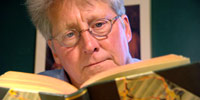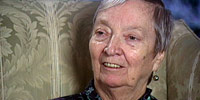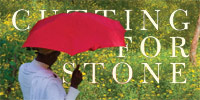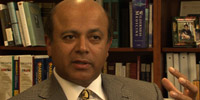Tag: fiction
“A Franciscan told me once, ‘Don’t keep track of the score. The score will take care of itself.’” Writer James Lee Burke’s best-selling crime novels are full of biblical imagery, messianic language, the influences of his Roman Catholic boyhood, and a longing for redemption. Originally broadcast October 11, 2013 More
“A Franciscan told me once, ‘Don’t keep track of the score. The score will take care of itself.’” Writer James Lee Burke’s best-selling crime novels are full of biblical imagery, messianic language, the influences of his Roman Catholic boyhood, and a longing for redemption. More
He is a Catholic deacon as well as a professor of English and creative writing, and his many novels come face to face with “the imponderables of life.” More
“There’s a flaw in human nature, and it’s in all great writing, the tragic flaw… and yet there is the expectation that ultimately it’s going to be okay,” said this beloved author and lay Episcopalian, who described herself as “a … More
The vocation of healing is a central theme in the acclaimed novel “Cutting for Stone” by Abraham Verghese, who writes that doctors “must believe that ministering to others will heal our woundedness. And it can. But it can also deepen the wound.” More
“Patients require that one-on-one encounter, the Samaritan function of being a physician,” says writer and Stanford Medical School professor Abraham Verghese. “I’m convinced that when the physician examines the patient, this is an incredibly important ritual.” More
The vocation of healing is a central theme in the acclaimed novel “Cutting for Stone” by Abraham Verghese, who writes that doctors “must believe that ministering to others will heal our woundedness. And it can. But it can also deepen the wound.” More
“Patients require that one-on-one encounter, the Samaritan function of being a physician,” says writer and Stanford Medical School professor Abraham Verghese. “I’m convinced that when the physician examines the patient, this is an incredibly important ritual.” More
Some have called Flannery O’Connor our only great Christian writer, a Catholic from the Deep South who said her subject was “the action of grace in territory held largely by the devil.” More
Forty-five years after her death, how do Flannery O’Connor’s views about the South, race, violence, Catholicism, and Christian realism hold up? More








